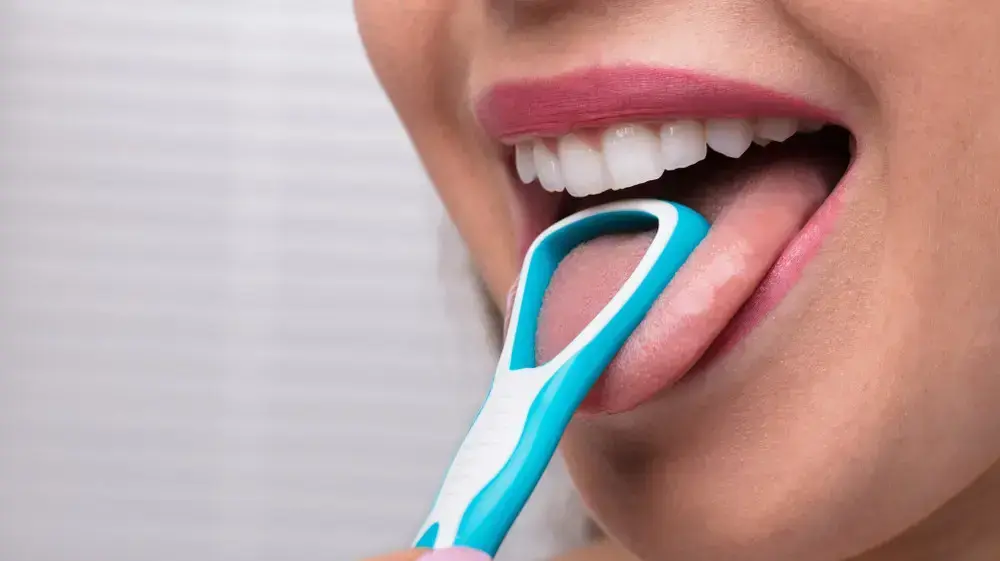- Click to share on Facebook (Opens in a new window)
- Click to share on Twitter (Opens in a new window)
- Click to share on LinkedIn (Opens in a new window)
- Click to email a friend (Opens in a new window)
How oral health influences your general health (2016 video)
(CNN) - Did wearing a mask during the coronavirus pandemic make you suddenly realize you have bad breath?
Hint: If you can smell your breath behind the mask, then your breath is totally unpleasant, since most people don't usually perceive it on their own, according to dentists.
In case the smell of your mouth qualifies as stinky, you should know that you and the rest of the people around you are victims of halitosis.
But don't worry, you're not the only one: Up to 80 million people suffer from chronic bad breath, according to the Academy of General Dentistry.
In addition to the obvious impact on your popularity, halitosis can also be a sign of disease and certain health conditions, some of which are serious.
So as you run to get a mint it might be helpful to know the top 10 reasons why your mouth smells so bad and what to do to remedy it.
- Forget about bad breath, smoking "rots" your brain
1. You are brushing your teeth badly
Yes, poor oral hygiene is one of the main causes of bad breath. When food gets trapped between the teeth and under the gums, the bacteria go on to break it down, creating putrefying gases that smell like rotten eggs or even worse (yes, poop).
According to dentists, one way to know if you have bad breath is to floss and then smell it. If you perceive a fetid sensation, then you will definitely know that your breath is toxic.
The good news is that you can easily correct this type of halitosis by brushing your teeth with fluoride-containing toothpaste twice a day and flossing regularly. While you're brushing, don't forget to brush your tongue and cheeks - studies show that brushing can reduce the load of bacteria.
Cosmetic mouthwashes and chewing gum only cover bad breath temporarily, dentists say, because neither one reduces bacteria.
2. You ate or drank something fragrant
Coffee. Garlic. Fish. Eggs. Onion. Spicy food. The foods we eat can easily cause bad breath.
Many of the foods that contribute to a stinky mouth do so by releasing sulfides. Sulfur, as you know, smells like rotten eggs.
A mint or chewing gum may mask halitosis, but be careful: smells from something you ate can linger until food is digested by your system, even if you brushed afterward. According to the Academy of General Dentistry, allyl methyl sulfide in coffee, onion, and garlic can remain in the bloodstream and be expelled through respiration for up to 72 hours after consumption.
So, try to counterattack with other foods such as lemon, parsley, apples or carrots that stimulate the production of saliva, a component that your mouth depends on to eliminate impurities. Drinking water also helps! While coffee, by contrast, slows down the production of saliva.
3. You eat a lot of sweets
Before you eat that next sweet, cake or cookie, pay attention. You may hear the happy chorus of bacteria living in your mouth. For them, sugar is a superfood and they do feast on decomposing it while leaving you with a bad memory.
Dentists explain that sticky sweets like jelly beans and candy are the worst. So if you must eat something sweet, they suggest pure chocolate. It has less sugar than many other sweets and dissolves more quickly in the mouth.
This is how easy you can get covid-19 in restaurants 1:154. You are on a low carb diet
Eating a lot of protein and few carbohydrates causes the body to enter a state of ketosis, that is, when your system begins to burn fat cells for energy.
This process creates waste called ketones. And having too many is not a good thing: Your metabolism has no choice but to become a stinking walking house, which excretes ketones through urine and breath. It is a musty smell, which many compare to rotten fruit.
The recommendation is to try to drink extra water to remove ketones from your body. If you use breath mints, candy, or gum, make sure they don't contain sugar.
5. You breathe through your mouth
During the night, the production of saliva decreases. That's why many people wake up with an unpleasant taste (and smell) in their mouths, even after brushing and flossing wisely.
Now breathing through your mouth or snoring, also sleep apnea, further dries your mouth, making your breath more infamous. Called xerostomia, having a dry mouth is not only unpleasant but also potentially harmful. You can develop a sore throat, hoarseness, trouble speaking and swallowing, problems wearing dentures, and even a change in your sense of taste.
The Solution: Get to the bottom of the matter of why you breathe through your mouth and work it out with plenty of water and following a good dental hygiene routine both in the morning and at night.
Of course, dentists also suggest regular check-ups. Don't be shy or embarrassed. If you tell your dentist about this problem, he or she can help you identify the cause.
6. The medicines you take are partly to blame
Hundreds of commonly used medications can dry out your mouth, contributing to disgusting breath. Some of those that most generate this situation are medicines to treat anxiety, depression, hypertension, and muscle pain and tension.
So, check the list of side effects of your medications to see if they cause dry mouth, and then talk to your doctor about the possibility of switching to another medicine that does not decrease saliva.
- What is the strange condition of the 'hairy' tongue?
7. You suffer from a stuffy nose or allergies
Do you have chronic sinus infections? Respiratory diseases? As your nose becomes congested, you are more likely to breathe through your mouth, drying out tissues and reducing the flow of saliva.
Also, if you have allergies, fighting to stop your runny nose from dripping constantly with an antihistamine can also lead to bad breath. Many of the prescription and over-the-counter medications to fight colds, flu, and allergies dry out more than just the nose.
Plus, all that runny nose can cause a bad smell to get trapped on the back of your tongue, which is incredibly difficult to reach with a toothbrush. Dentists recommend scraping the back of the tongue with a specially designed tool and using a mouthwash that contains chlorine dioxide.
8. You smoke or chew tobacco (or other things)
If you are a smoker, you probably have no idea how the smell of tobacco adheres to your clothes and belongings ... and especially to your breath. Ingesting hot smoke diminishes your senses, and therefore your ability to smell and taste.
Obviously, hot air also dries out the mouth. Loss of saliva, combined with the smell of tobacco, creates the infamous "smoker's breath." Dry mouth is also a side effect of smoking or ingesting marijuana, a growing scenario across the United States, as several states have legalized cannabis.
Do you chew tobacco? It is obvious that your teeth will get stained, your gums will suffer and your breath will stink.
The solution? You know.
9. Do you drink alcohol
Yes, we are still talking about things that dry your mouth. That, friends who love wine, beer, cocktails, includes alcohol. Not to mention that wine contains sugar, like many of the mixers that come in cocktails. If you hear the joyous screams of bacteria in your mouth?
Fight back with sugar-free candy or gum, as both stimulate saliva production. Don't forget to drink water (it's also good for preventing hangovers), brush and floss as soon as possible.
But here's an irony: Many mouthwashes contain alcohol. So if halitosis doesn't leave you alone, talk to your dentist about using a therapeutic mouthwash designed to reduce plaque.
Drinking alcohol causes personality changes 4:3510. You have a medical condition that you may not know about
Do you suffer from heartburn, acid reflux or gastroesophageal? Vomiting a little food or acid into your mouth can create bad breath. Don't think that's just something in bad taste; Untreated gastroesophageal reflux can easily become a serious disease, even cancer.
Bad breath can also be an early sign of an underlying illness that may have no external symptoms.
One of the signs of diabetic ketoacidosis, a life-threatening condition that primarily affects people with type 1 diabetes, is fruit-smelling breath. It occurs because people with little or no insulin cannot process ketone acids, allowing them to accumulate toxic levels in the blood.
Sweet smelling breath in a person with type 1 diabetes should take immediate medical action. In unusual cases, people with type 2 diabetes can also develop the disease.
People with severe chronic kidney failure can have ammonia-like breath, which according to the United States National Library of Medicine, can also be described as "urine or fish-like."
A sign of liver disease is liver stink, a strong, sweet, musty smell on the breath. It occurs because a diseased liver cannot fully process limonene, a chemical found in citrus peels and in some plants. Scientists are trying to develop an odor-based breath test that can alert doctors to early-stage liver cirrhosis so that it can be treated.
Editor's Note : This story is an update to a note originally published in November 2018.
Halitosis Bad breath









